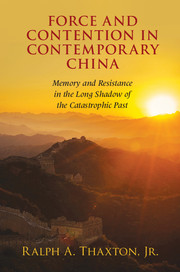 Force and Contention in Contemporary China
Force and Contention in Contemporary China Published online by Cambridge University Press: 05 August 2016
In his 2002 warning on pandemic corruption, Chairman Hu Jintao focused mainly on local governments and local officials, as if only they, and not Central government politicians, were giving villagers cause to resist the party-state. The thrust of the Deng and post-Deng reform, however, was to restore CCP control at the central and local levels, and this entailed supporting local strongmen such as Da Fo party secretary Bao Zhilong. In this respect, reform actually involved a political restoration of party-centered power as opposed to the charismatic-based power of the Mao period, and Beijing relied on recycled Mao-era officials and local party leaders in hinterland villages where the legitimacy crisis stemming from the Great Leap's damage persisted. This process favored political hustlers who had been in leadership positions previously, and they often became the ground-level agents of Beijing politicians in charge of important sectors of the reform-era political economy.
Sure enough, Da Fo's farmers say that reform-era corruption was structured in part by big-name Chinese Communist Party (CCP) officials in charge of centralized state monopolies. They point out that the extension of state monopoly into the hands of party boss Bao Zhilong's local political network engendered a pattern of audacious rent-seeking at both the macro and micro levels, and their stories reveal that this pattern stoked memories of Great Leap–era domination and abuse. Indeed, in some important ways, corruption in the village was a direct result of the monopoly power of the CCP.
Popular experience with the Central government control of electricity stemmed all the way back to the 1950s when the Mao-led CCP – following Lenin, who took electricity as an icon of modernity – promised to provide rural China with electricity to promote development and alleviate poverty. While the Great Leap saw the construction of miniature hydroelectric power stations in parts of the rural interior, the center did not invest in these stations. The Maoist emphasis, instead, was on commune-supervised electricity-driven water conservancy projects and irrigation wells. The primary beneficiaries were official networks and a few farmers in communes and model villages such as Dingcun in Liangmen People's Commune.
To save this book to your Kindle, first ensure no-reply@cambridge.org is added to your Approved Personal Document E-mail List under your Personal Document Settings on the Manage Your Content and Devices page of your Amazon account. Then enter the ‘name’ part of your Kindle email address below. Find out more about saving to your Kindle.
Note you can select to save to either the @free.kindle.com or @kindle.com variations. ‘@free.kindle.com’ emails are free but can only be saved to your device when it is connected to wi-fi. ‘@kindle.com’ emails can be delivered even when you are not connected to wi-fi, but note that service fees apply.
Find out more about the Kindle Personal Document Service.
To save content items to your account, please confirm that you agree to abide by our usage policies. If this is the first time you use this feature, you will be asked to authorise Cambridge Core to connect with your account. Find out more about saving content to Dropbox.
To save content items to your account, please confirm that you agree to abide by our usage policies. If this is the first time you use this feature, you will be asked to authorise Cambridge Core to connect with your account. Find out more about saving content to Google Drive.